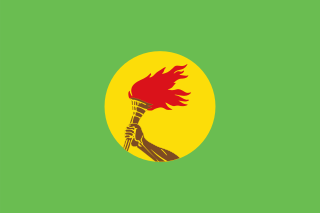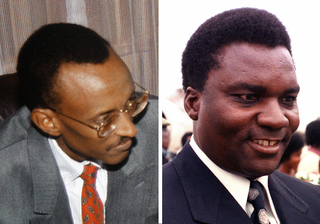 |
|---|
This article lists political parties in Rwanda. Rwanda is a one-party-dominant state with the Rwandan Patriotic Front in power. Opposition parties are allowed, but are widely considered to have no real chance of gaining power.
 |
|---|
This article lists political parties in Rwanda. Rwanda is a one-party-dominant state with the Rwandan Patriotic Front in power. Opposition parties are allowed, but are widely considered to have no real chance of gaining power.
=== Parties represented in the Chamber of Deputies
| Party | Abbr. | Leader | Political position | Ideology | Chamber seats | |||
|---|---|---|---|---|---|---|---|---|
| RPF Coalition | Rwandan Patriotic Front Ishyaka FPR-Inkotanyi Front patriotique rwandais | RPF–Inkotanyi FPR–Inkotanyi | Paul Kagame | Big tent | Rwandan nationalism Right-wing populism Economic liberalism | 37 / 80 | ||
| Centrist Democratic Party Ishyaka Riraranira Demokrasi Ihuza Abanyarwanda Parti démocrate centriste | CDP PDC | Agnes Mukabaranga | Centre-right | Christian democracy | 1 / 80 | |||
| Party for Progress and Concord Ishyaka ry’Iterambere n'Ubusabane Parti pour le progrès et la concorde | PPC | Alivera Mukabaramba | 1 / 80 | |||||
| Democratic Union of the Rwandan People Union démocratique du peuple rwandais | UDPR | 1 / 80 | ||||||
| Social Democratic Party Ishiyaka Riharanira Demokrasi n'Imibereho Myiza y’Abaturage Parti social démocrate | PSD | Vincent Biruta | Centre-left | Social democracy | 5 / 80 | |||
| Liberal Party Ishyaka ry’Ukwishyira Ukizana Parti libéral | PL | Prosper Higiro | Centre | Liberalism | 5 / 80 | |||
| Ideal Democratic Party Ishyaka Ntangarugero Muri Demokrasi Parti démocratique idéal | IDP PDI | Islamic democracy | 2 / 80 | |||||
| Social Party Imberakuri Ishyaka ry’Imberakuri Riharanira Imibereho Myiza Parti social imberakuri | PS–Imberakuri | Bernard Ntaganda | 2 / 80 | |||||
| Democratic Green Party of Rwanda Ishyaka Riharanira Demokarasi no Kurengera Ibidukikije Parti vert démocratique du Rwanda | PVDR | Frank Habineza | Green politics Liberal democracy | 2 / 80 | ||||
| Flag | Party | Abbr. | Leader | Political position | Ideology |
|---|---|---|---|---|---|
 | Democratic Forces for the Liberation of Rwanda Forces Démocratiques de Libération du Rwanda | DFLR | Callixte Mbarushimana | Right to Far-Right | Hutu Power Tropical Fascism |
| United Democratic Forces of Rwanda Forces Democratiques Unifiées du Rwanda | UDF-INKIGI | Placide Kayumba | Center to Center-Left | Liberal Democracy Egalitarianism Green Politics Anti-Racism Anti-Fascism Anti-Authoritarianism Anti-Kagame Decentralization | |
| Republican Democratic Movement Mouvement démocratique républicain | RDM | Center-Right to Right Wing Far-Right (Extremist Factions) | Hutu interests Hutu Power (Extremist Factions) | ||
| Rwanda National Congress Congrès national rwandais | RNC | Kayumba Nyamwasa | Center | Anti-Kagame | |

Rwanda is a de facto one-party state ruled by the Rwandan Patriotic Front and its leader Paul Kagame since the end of the 1994 genocide against members of the Tutsi ethnic group. Although Rwanda is nominally democratic, elections are manipulated in various ways, which include banning opposition parties, arresting or assassinating critics, and electoral fraud.

Zaire, officially the Republic of Zaire, was the name of the Democratic Republic of the Congo from 1971 to 1997. Located in Central Africa, it was, by area, the third-largest country in Africa after Sudan and Algeria, and the 11th-largest country in the world from 1965 to 1997. With a population of over 23 million, Zaire was the most populous Francophone country in Africa. Zaire played a central role during the Cold War.
Human occupation of Rwanda is thought to have begun shortly after the last ice age. By the 11th century, the inhabitants had organized into a number of kingdoms. In the 19th century, Mwami (king) Rwabugiri of the Kingdom of Rwanda conducted a decades-long process of military conquest and administrative consolidation that resulted in the kingdom coming to control most of what is now Rwanda. The colonial powers, Germany and Belgium, allied with the Rwandan court.

Juvénal Habyarimana was a Rwandan politician and military officer who was the second president of Rwanda, from 1973 until his assassination in 1994. He was nicknamed Kinani, a Kinyarwanda word meaning "invincible".

The Rwandan Patriotic Front is the ruling political party in Rwanda.
The Republican Democratic Movement was a political party in Rwanda.

The Rwandan genocide, also known as the genocide against the Tutsi, occurred between 7 April and 19 July 1994 during the Rwandan Civil War. During this period of around 100 days, members of the Tutsi minority ethnic group, as well as some moderate Hutu and Twa, were killed by armed Hutu militias. Although the Constitution of Rwanda states that more than 1 million people perished in the genocide, the demographic evidence suggests that the real number killed was likely lower. The most widely accepted scholarly estimates are around 500,000 to 662,000 Tutsi deaths.
The Arusha Accords, officially the Peace Agreement between the Government of the Republic of Rwandaand the Rwandan Patriotic Front, also known as the Arusha Peace Agreement or Arusha negotiations, were a set of five accords signed in Arusha, Tanzania on 4 August 1993, by the government of Rwanda and the rebel Rwandan Patriotic Front (RPF), under mediation, to end a three-year Rwandan Civil War. Primarily organized by the Organisation of African Unity and the heads of state in the African Great Lakes region, the talks began on 12 July 1992, and ended on 4 August 1993, when the accords were finally signed.

Grégoire Kayibanda was a Rwandan politician and revolutionary who was the first elected President of Rwanda from 1962 to 1973. An ethnic Hutu, he was a pioneer of the Rwandan Revolution and led Rwanda's struggle for independence from Belgium, replacing the Tutsi monarchy with a republican form of government. Rwanda became independent from Belgium in 1962, with Kayibanda serving as the country's first president, establishing a pro-Hutu policy and a de facto one-party system governed by his party, Parmehutu. He was overthrown in a coup d'état in 1973 by his defense minister, Juvénal Habyarimana, and died three years later.

The Burundian Civil War was a civil war in Burundi lasting from 1993 to 2005. The civil war was the result of longstanding ethnic divisions between the Hutu and the Tutsi ethnic groups. The conflict began following the first multi-party elections in the country since its independence from Belgium in 1962, and is seen as formally ending with the swearing-in of President Pierre Nkurunziza in August 2005. Children were widely used by both sides in the war. The estimated death toll stands at 300,000.

The National Revolutionary Movement for Development was the ruling political party of Rwanda from 1975 to 1994 under President Juvénal Habyarimana, running with first Vice President Édouard Karemera. From 1978 to 1991, the MRND was the only legal political party in the country. It was dominated by Hutus, particularly from President Habyarimana's home region of Northern Rwanda. The elite group of MRND party members who were known to have influence on the President and his wife are known as the akazu. In 1991, the party was renamed the National Republican Movement for Democracy and Development.

Elections in Rwanda are manipulated in various ways, which include banning opposition parties, arresting or assassinating critics, and electoral fraud. According to its constitution, Rwanda is a multi-party democracy with a presidential system. In practice, it functions as a one-party state ruled by the Rwandan Patriotic Front and its leader Paul Kagame. The President and majority of members of the Chamber of Deputies are directly elected, whilst the Senate is indirectly elected and partly appointed.

The Rwandan Civil War was a large-scale civil war in Rwanda which was fought between the Rwandan Armed Forces, representing the country's government, and the rebel Rwandan Patriotic Front (RPF) from 1 October 1990 to 18 July 1994. The war arose from the long-running dispute between the Hutu and Tutsi groups within the Rwandan population. A 1959–1962 revolution had replaced the Tutsi monarchy with a Hutu-led republic, forcing more than 336,000 Tutsi to seek refuge in neighbouring countries. A group of these refugees in Uganda founded the RPF which, under the leadership of Fred Rwigyema and Paul Kagame, became a battle-ready army by the late 1980s.

The Prime Minister of Rwanda is the head of government of the Republic of Rwanda. The prime minister is appointed by the president, along with other ministers in the Cabinet. A total of 11 people have served in the office. The incumbent prime minister is Édouard Ngirente, who took office on 30 August 2017.

The Federation of Green Parties of Africa is an umbrella body of the various national Green parties and environmental parties in Africa. The formal coalition, the African Greens Federation (AGF) formed in 2010 at a conference in Kampala, Uganda. As part of the Global Greens, founded in 2001 in Canberra, Australia, the parties included in the Federation of Green Parties of Africa follow the Global Greens Charter. The organization's permanent administration is in Ouagadougou, the capital of Burkina Faso, where the predominant green organization is the Rassemblement Des Ecologistes du Burkina Faso. These parties tend to, but not always, be left-leaning and often do not have widespread support in their respective countries.

The Constitution of Rwanda was adopted by referendum on May 26, 2003. It replaced the Constitution of 1991.

The Coalition for the Defence of the Republic was a Rwandan far-right Hutu Power political party that took a major role in inciting the Rwandan genocide.
Hutu Power is an ethnic supremacist ideology that asserts the ethnic superiority of Hutu, often in the context of being superior to Tutsi and Twa, and therefore, they are entitled to dominate and murder these two groups and other minorities. Espoused by Hutu extremists, widespread support for the ideology led to the 1994 Rwandan genocide against the Tutsi and the members of their families, the moderate Hutu who opposed the killings, and the Twa, who were considered traitors. Hutu Power political parties and movements included the Akazu, the Parmehutu, the Coalition for the Defence of the Republic and its Impuzamugambi paramilitary militia, and the governing National Republican Movement for Democracy and Development and its Interahamwe paramilitary militia. The belief in the theory that Hutu people are superior is most common in Rwanda and Burundi, where they make up the majority of the population. Due to its sheer destructiveness, the ideology has been compared to Nazism in the Western world.

The 1973 Rwandan coup d'état, also known as the Coup d'état of 5 July, was a military coup staged by Juvénal Habyarimana against incumbent president Grégoire Kayibanda in the Republic of Rwanda. The coup took place on 5 July 1973 and was considered by many as a betrayal.
In the Rwandan Revolution, the coup of Gitarama was an event which occurred on 28 January 1961 in which the monarchy in Rwanda, then a part of the Belgian mandate of Ruanda-Urundi, was abolished and replaced with a republican political system. The traditional monarchy was led by a Mwami (king), who ruled through an administration of chiefs and subchiefs in the context of a feudal system of patron-client relations based on tribute. The Mwami and most of his chiefs were members of the Tutsi ethnic minority, a group which wielded considerable social, political economic power. Of subordinate status to the Tutsis was the Hutu ethnic majority. As part of their rule, the Belgians institutionalised a racial hierarchy which favoured the Tutsis at the expense of the Hutus.